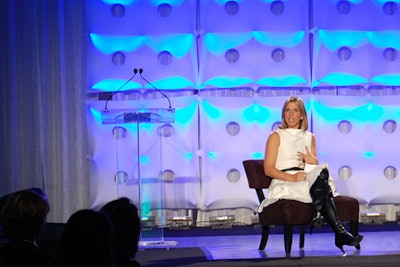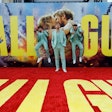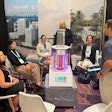
At the BizBash Expo & Awards on Wednesday at the Jacob K. Javits Convention Center, more than 3,200 event professionals gathered to hear experts discuss strategies for online marketing, negotiating, fund-raising efforts, and other issues. However, as much as the midterm elections have kept the recession at the forefront of public conversation, talk at the show turned to more optimistic topics, providing an outlook for the coming year that's less encumbered by economic woes and more focused on creative, smart, and efficient ideas for moving forward.
Looking to 2011
During his afternoon keynote presentation, Arthur Backal of Backal Hospitality Group and State of the Art Enterprises set out his predictions for 2011 and how planners, vendors, and marketers should adapt. "It's not the economy [next year]. Focus on goals and know where you want to be, be hungry for new opportunities, set achievable budgets, articulate the objective of the event, curb your client's enthusiasm, and reinforce your client's decision to hire a planner," he said. The hospitality veteran and planner, like many other speakers and panelists, stressed that while the economy is still recovering, the industry should be looking beyond the downturn to dealing with clients who are now better educated about new technologies and events than ever before.
That's not to say planners and suppliers shouldn't be cost-conscious and continually strive to prove their worth, especially since the Internet has created an instant, searchable marketplace and the economy has necessitated greater price elasticity. What is key is knowing what you do best and bringing in others to do what you can't. Save the Date founder and morning keynote speaker Jennifer Gilbert said, "One of the biggest lightbulb moments for me was when I realized I can't do it all myself. Outsource everything but your soul."
Backal echoed that sentiment. "Bring others in where you're weak and you can only make yourself stronger," he said, insisting these relationships are a big part of successful negotiations. "How do you make everyone go home thinking they're a winner? The right attitude and patience."
Debating Catering
Indeed, during the catering panel, Carla Ruben of Creative Edge Parties spoke of the greater integration between vendors and the challenge for all to incorporate the event's message that will create a unified look and experience: "Ten years ago, design, entertainment, and catering were separate, and now we're coming together under one roof to make one experience, instead of operating as three separate entities." And this collaborative effort has a greater impact on engaging attendees.
"There's a lot to be said about guests wanting to be involved in an event," said fellow panelist Thomas Preti, explaining why his company came up with the idea for a bar where people can customize their own Bloody Marys. Theatrical service and presentation are, according to Olivier Cheng, worth the extra effort and cost, especially if they create conversation.
Still, Preti suggested that there's a need to simplify food and drink. "We tend to overdo and overthink it, making our menus overcomplicated," said Preti. "I often feel we have too many ingredients. I don't think guests need to be challenged."
Social Media
The same can be said for the use of Facebook, Twitter, and other online marketing tools, which were mentioned frequently during the day, during panels as well as at a social media session on the trade show floor. "Facebook is designed not to benefit those who yell the loudest, but those who are the most interactive," said Erik Mintz, general manager of Constant Contact, who spoke of the benefits as well as the potential downsides. "These tools are exceedingly affordable, give organizations greater visibility, and can be used to help create meaningful online experiences," he added, explaining that whatever the medium is, good marketing should leave a lasting impression. "[With email marketing], if you do it wrong, people will think your emails are spam."
Stephanie Thomas, president of Susan Ulin Associates, agreed, arguing that while social media will continue to grow, organizations shouldn't lose sight of important online aspects such as Google search results. "You don't have to do what everyone else is doing," she said. In fact, according to Rafael Mael, marketing strategist at Baltimore-based Brand Launcher, "Research shows the average American is exposed to 3,300 marketing messages a day." He added that the single most effective form is word of mouth. "Most purchase decisions are made through referrals. It's important to make a personal connection."
Transparent Behavior
The overriding message from all speakers was that accountability and clarity about what you do, and how and why you do it, is the smartest business strategy, whether you're a nonprofit planner, corporate marketer, or third-party supplier. When discussing the difference between event planning fees that are itemized (flat, time-based, or a percentage of the overall budget) and those that are not (markups embedded in pricing or commissions), Howard Givner, executive director of the Event Leadership Institute, said, "The biggest difference between a commission and a kickback is disclosure."
Likewise, in answering an attendee's question about performance ratings from organizations like Charity Navigator, Dara P. Richardson-Heron, C.E.O. of Susan G. Komen for the Cure, said, "A four-star rating isn't extremely important. What is, is showing where X percent of funds are going."
"The most persuasive word in marketing is because. People need reasons—forget about pumped-up marketing words, because people don't read them," Mael said.



















